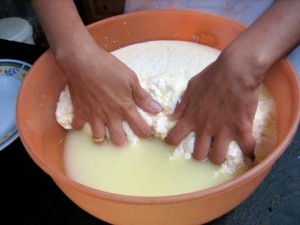
FDA closes cheese plant linked to listeriosis illnesses and death



Health authorities from US Center for Disease Control and Prevention (CDC) announced today the investigation into an outbreak of listeriosis linked to Hispanic cheeses. The outbreak has lead to a death and seven other illnesses in Maryland and California. CDC reports that five of the illnesses (2 mother-newborn pairs and a newborn) were related to pregnancy and all patients are of Hispanic ethnicity.
Among persons for whom information is available, dates that illness was diagnosed range from August 1, 2013 to November 27, 2013. Seven of the eight ill persons were hospitalized. Five of the illnesses were related to a pregnancy; two of these were diagnosed in two mother–newborn pairs, and one in only the newborn. The three other illnesses occurred among adults. 
In interviews, ill persons answered questions about foods consumed and other exposures in the month before becoming ill. All patients in Maryland reported consuming soft or semi-soft Hispanic-style cheese and all shopped at different locations of same food store chain (Chain A). Testing of cheese products collected from Chain A (VDACS reports it as Mega Mart -ben) stores was performed in Maryland and Virginia.
Virginia’s Division of Consolidated Laboratory Services (DCLS) identified the outbreak strain of Listeria monocytogenes in a sample of Caujada en Terron (fresh cheese curd) collected by the Virginia Department of Agriculture and Consumer Services (VDACS) from a Chain A store. This cheese was likely produced by Roos Foods of Kenton, Delaware and was later repackaged in the Chain A store. VDACS issued a press release on February 15, 2014 instructing persons who purchased this product not to consume the cheese and to discard any remaining product.
 From the VDACS press release,
From the VDACS press release,
On February 10, 2014, Listeria monocytogenes, a bacterium that can cause human illness, was isolated from a sample of Cuajada en Terron (Fresh Cheese Curd) collected by food safety inspectors from Virginia Department of Agriculture and Consumer Services. The sample was collected at Mega Mart, a retail store located at 8328 Shopper’s Square, Manassas, VA 20111. The product was sold in clear, unlabeled plastic bags held in the retail cheese display cooler within the facility.
Listeria affects the elderly and pregnant women disproportionately more than healthy adults and is fatal 25-30 per cent of the time. Hispanic style fresh cheese is regularly linked to Listeria cases. In January, Oregon public health officials issued a warning for illegally imported cheese from Mexico that is believed responsible for giving an unborn baby Listeria. In 2010, Two Oregon mothers have were sickened by Listeria after eating tainted Mexican-style cheese made in Yakima, causing their babies to be born with a serious illness